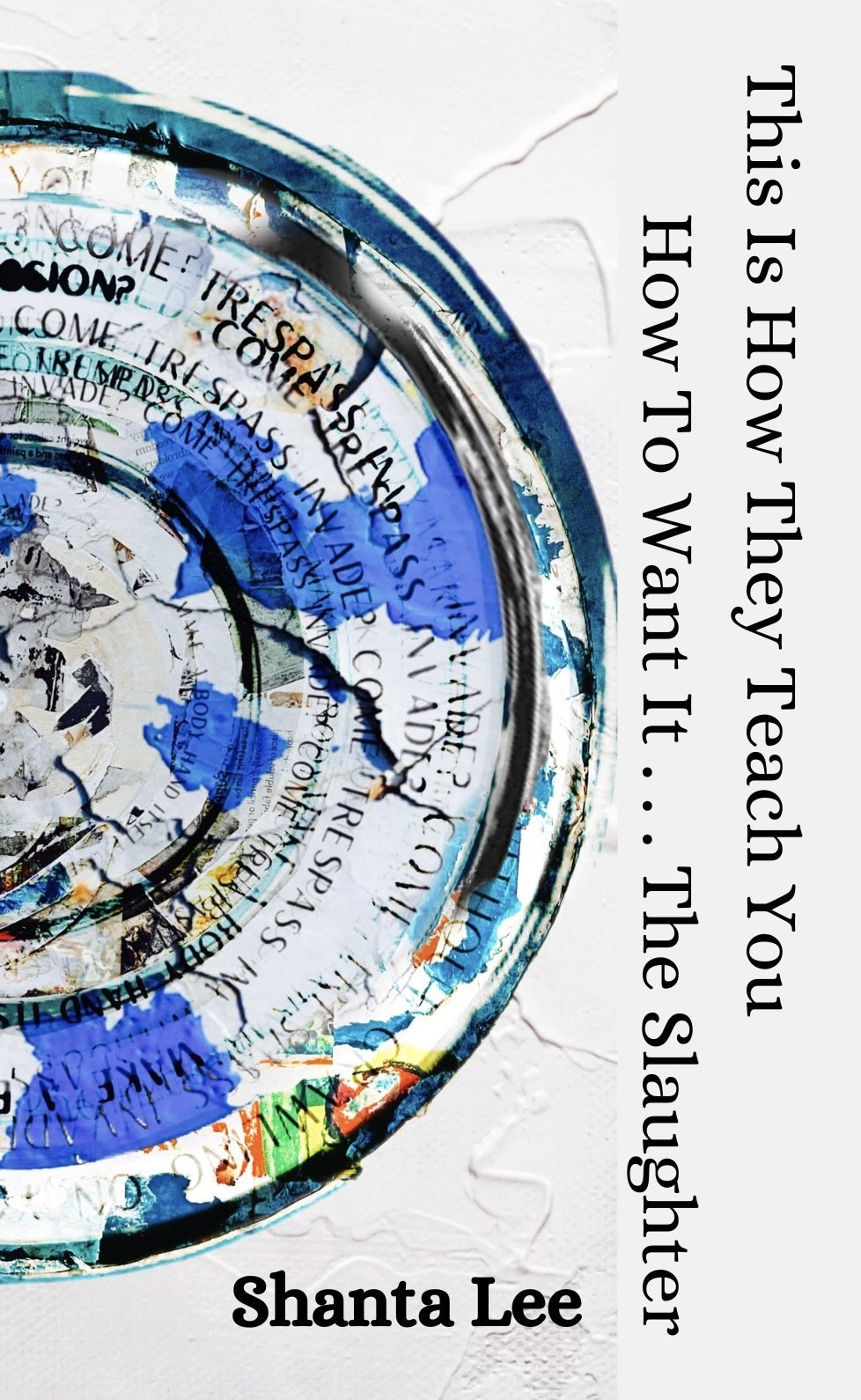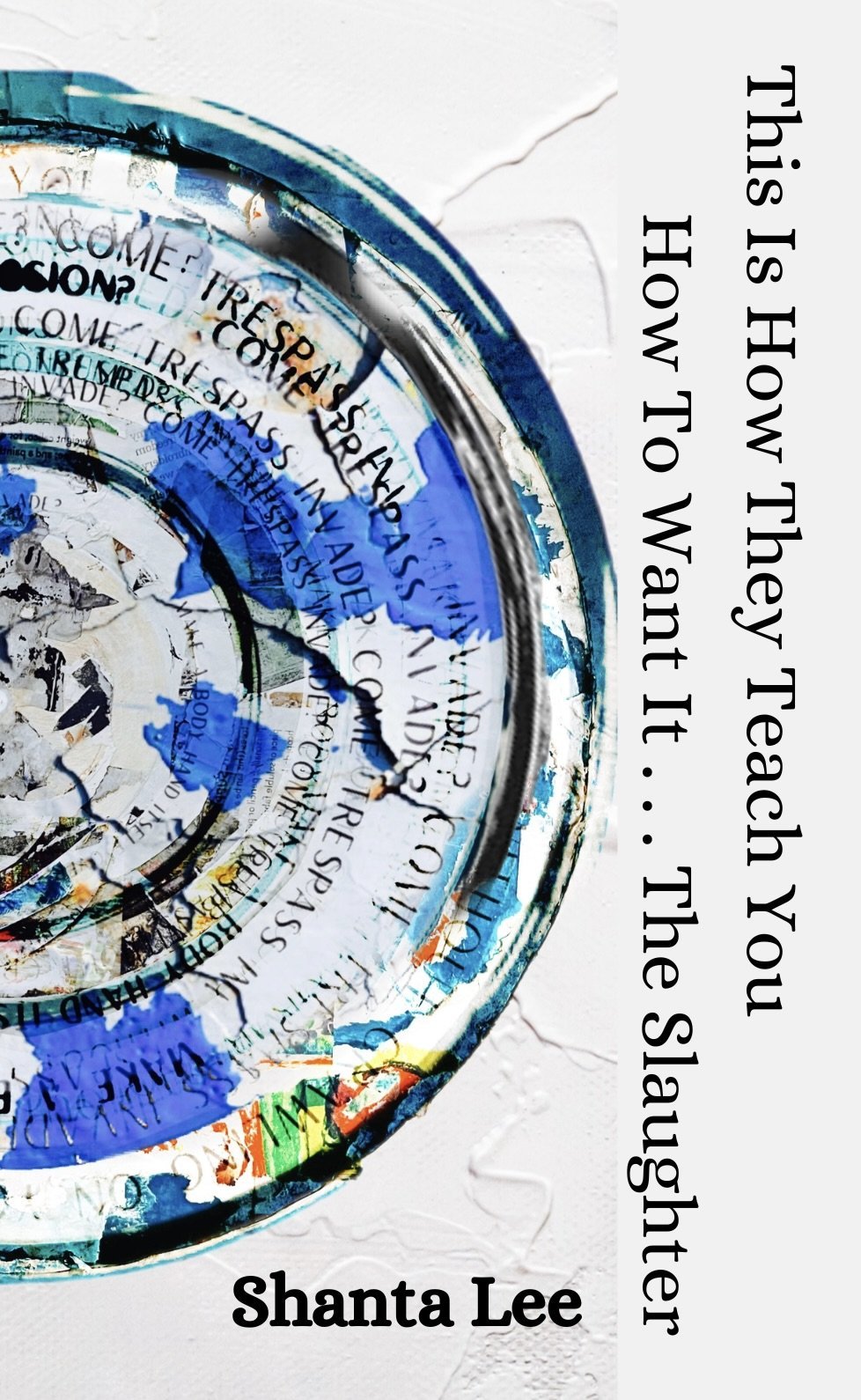Philly Poetry Chapbook Review is pleased to feature Shanta Lee’s poem “This Is How They Teach Us How to Want It . . .
The Slaughter” as our first featured chapbook poem of Issue 8: Spring 2025. You can find more poetry in their chapbook, This is How They Teach You How to Want It . . . The Slaughter, now available from Harbor Editions.
This Is How They Teach Us How to Want It . . . The Slaughter
We said catch me not realizin’
they like to wear their kill
They set bear traps, live
among abandoned rotted flesh
We trained to be the kill all our lives
We ache, we want, we lust this promise
of slaughter Chase. Hunt. Get.
This Is How They Teach You How To Want It . . . The Slaughter
To feed a corpse eater, you must . . .
Submit: The way you will shut your own eyes cover them
Cover your own ears. Fold in on yourself
The quiet within the folding mimics mama’s womb
Or it’s the names of God
Or it’s how others, just like you, are present
(the kill is less nervous that way)
The calm of your surrender is the stuff of legend
This is how
Presentation: Place body on butcher block with your own hands
Expose your own neck, your belly
With your own hands, give the blade its instruction
they teach you
Be the digested thing: Feed the corpse eater with your flesh
Rest in the Slaymaker’s belly. Be the dead thing,
a thing well – done, a died thing
to want it . . . the slaughter
You’re the kill who wants to be the kill
This is how they taught you . . . the wanting
They still tell about the way you enjoyed
About the way you wanted them standing
above you, about how you smiled wide,
in imagined glory, rested in your marrow
To all who hear this story, you are the
profaned that became the sacred because . . .
who wouldn’t want that?
About the Poem
The concept of slaughter is usually connected to other animals in the animal kingdom, but I wanted to think about two things:
How do we participate in our slaughter in ways that are more metaphorical and bloodless?
Are we trained to want our own undoing or slaughtering? If so, how, when and why?
This poem and the overall exploration in the chapbook aren’t just about an exchange in a relationship—that’s surface level. It’s about the continuum that ranges from the board room, the cubicle or office space, to an exchange with a stranger in any setting, to the bedroom. I tortured loved ones with conversations asking them about their definitions of a bloodless slaughter, which deepened my perspective on the concept.
The chapbook and this poem are also intended to make us sit with some uncomfortable truths, especially about power—the ways we will enjoy it, reign it over others, or hand ours over—while sometimes blaming someone else for the dynamics at hand.
This poem explores the levels of our participation in handing ourselves over, often to the people, places, or things that deserve no such delight.
Author Bio
Shanta Lee is an award-winning visual artist, writer across genres, author, and public intellectual who often says she is a “…practitioner of entanglement” for all of the ways she brings things together in her work. Winner of the New England Poetry Club’s Grant for Poetic Achievement, Abel Meeropol Social Justice Writing Award, and a 2024 National Arts Strategies Creative Community Fellow (New England), her work has been widely featured in Harper’s Magazine, The Massachusetts Review, ITERANT Literary Magazine, Palette Poetry, Prism, Ms. Magazine, and DAME Magazine, alongside of her former radio segment she created, produced, and reported for Vermont Public. Shanta Lee is the co-editor of the forthcoming anthology Sign & Breath: Voice and the Literary Tradition (Etruscan Press, 2025). To explore more of her books, visual art, and writing, visit Shantalee.com.
From This is How They Teach You How to Want It . . . The Slaughter
“What does it mean to be hunted, to be ravaged, to be water they crave to put the fire out in their throats? In her book This is How They Teach You How to Want It . . . The Slaughter, Shanta Lee explores the mercurial world of monsters and prey, of destruction and culpability from the perspective of the hungry / The never fully fed / the . . . come here // closer. In a nightmare world, who can be trusted? Shanta urges the reader to see that predators will maim you with different names / . . . make you use your own hands / to climb onto the butcher’s board. Through deft allusions, precise horror and questions that echo our worst fears, Shanta provides a surreal map of questions and images for making sense of devastation, survivorship and forging ahead in a treacherous world. After all, Some hunger is a taught taut thing / Some hunger demands questions.” —Joan Kwon Glass, author of Daughter of Three Gone Kingdoms (Perugia Press, 2024)

Contents
Book Excerpt: The Prize of Québec by Jennifer Nelson
“I tend to lean into the transconstitutory powers of ekphrasis. … Only in poetry can one go to the moon in a way that critiques the quest for the moon.” Read a poem from Jennifer Nelson’s new collection from Fence Books, On the Way to the Paintings of Forest Robberies.
Chapbook Poem: This Is How They Teach Us How to Want It . . . by Shanta Lee
“This poem explores the levels of our participation in handing ourselves over, often to the people, places, or things that deserve no such delight.” Read a #poem from Shanta Lee’s new book from Harbor Editions, This Is How They Teach Us How to Want It . . . The Slaughter.
Three Poems by Jonathan Fletcher
“Instead of having to choose between religion or the LGBTQ community (which I know many member of the latter feel they have to do), I think it is possible (and maybe even biblical) to integrate both into one’s life.” Read three original poems from Jonathan Fletcher, along with words from the author.
What Happened? On You are Leaving the American Sector by Rebecca Foust
“Rebecca Foust’s new chapbook of poems has a strange prescience. … Foust isn’t alone in making the obvious connection between Trump’s first term and Orwell’s dystopia.” Read the full chapbook review by new contributor Rick Mullin.
‘What if we started creating together? What if we looked at who we are from the side and saw a much more complete and honest perspective?” Read four poems by poet Sarah E N Kohrs, along with words from the poet.
Book Excerpt: Challenger by Colleen S. Harris
“If we look beyond the voyeuristic tendency to focus on the tragedy, what might we see? This poem was a chance for me to zoom in on the calm before the storm.” New poem from Colleen S. Harris’s new book from Main Street Rag, The Light Becomes Us, along with words from the poet.
Chapbook Poem: What I Did This Summer by Elinor Serumgard
“I love New Year’s and the promise of a new start, but I like to remind myself that you can start fresh at any point throughout the year.” New poem from Elinor Serumgard’s chapbook from Bottlecap Press, Analogous Annum, along with words from the poet.
Four Poems by Christa Fairbrother
“Since women aren’t allowed the power of our anger, we take it out on each other, and that’s what this poem is hinting at.” Read four poems by Christa Fairbrother, along with words from the poet.
Multilingualism and Metaphor: On Desire/Halves by Jaia Hamid Bashir
“Bashir’s elegant debut collection investigates identity as the result of choices between individual appetites and cultural frames. … [It] announces an exciting addition to the global chorus of contemporary literature.” Read D.W. Baker’s full review.
Five Poems by Jane Ellen Glasser
“In my fantasy world, I would be able to communicate with the animals I see every day.” Read five naturalist poems by poet Jane Ellen Glasser, along with a few words from the poet.
Book Excerpt: Ars Poetica by Leigh Sugar
“[C]ould there be, a poetry that does investigate the body, without explosion? Maybe even with an effort towards reconstruction?” Read an excerpt from Leigh Sugar’s book, FREELAND, from Alice James Books, along with words from the author.
“…she has a sense of style, a modicum of grace, and she recognizes her place in the cosmic order, where revolution rules every other Wednesday and twice, of course, on Sundays…” Read three poems by Bart Edelman along with words from the poet.
Chapbook Poem: I Worry by Flavian Mark Lupinetti
“I can’t begin to imagine doctors in Gaza courageously practicing medicine while intentionally targeted by the Israeli army aided by the United States.” Read the featured Chapbook Poem of the Month for June 2025, “I Worry” from The Pronunciation Part by Flavian Mark Lupinetti.
“Quantum physics leads us to the uncanny and the terrifying. I know people fear black holes, but to me they rearrange our relationship to time and to our own lives.” Read four #poems by Victoria Korth along with words from the poet.



